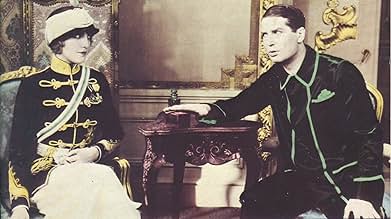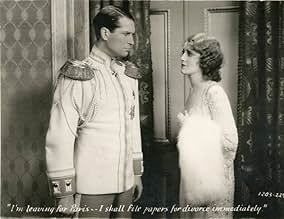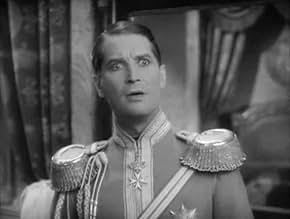IMDb RATING
7.0/10
2.8K
YOUR RATING
The queen of mythical Sylvania marries a courtier, who finds his new life unsatisfying.The queen of mythical Sylvania marries a courtier, who finds his new life unsatisfying.The queen of mythical Sylvania marries a courtier, who finds his new life unsatisfying.
- Nominated for 6 Oscars
- 4 wins & 6 nominations total
Carl Stockdale
- The Admiral
- (as Carlton Stockdale)
Albert De Winton
- Cabinet Minister
- (as Albert de Winton)
Featured reviews
Poor Queen Louise when she is awakened by her attendants she has been dreaming of love but must face another day in the Kingdom of Sylvania without a husband. When an errant military adjutant is recalled from Paris to face her censure she falls for his charms and he for hers, and they marry. But the Queen's new husband is unhappy in the role of obedient consort. Conflict arises but is eventually resolved, as we know it will be in operetta land.
This early Lubitsch musical rates about the same as MONTE CARLO made a year later. The highlight here is the performance of Maurice Chevalier as the consort, a sort of pre-Cary Grant Cary Grant, Gallic style. He has the same effortless magnetism and charm and a certain physical resemblance. Jeanette MacDonald is as good here as in MONTE CARLO, handling songs and dialogue with equal aplomb and looking gorgeous in her filmy gowns. As is usual with Lubitsch, there is a superior supporting cast, here including the formidable Lupino Lane as Chevalier's valet, a sassy and brassy Lillian Roth as Lane's love interest and Edgar Norton as the "Master of Ceremonies," the personification of royal lackey. Another Lubitsch hallmark, the measured depiction of ritualistic daily activities, gets much display in the context of the protocols of a royal palace. The songs by Victor Schertzinger and Clifford Grey are only passable and the primitive sound recording doesn't help in getting them across but the tone of the whole enterprise is so frothy and pleasant that one doesn't mind not hearing all of the lyrics.
When you compare this film to other musicals from the dawn of the sound era like Broadway MELODY the difference is glaring. Lubitsch's camera is liberated and fluid and we get an assortment of physical approaches to song and dance numbers which themselves vary in style from pompous operetta-military to musical hall slapstick to Gilbert-and- Sullivanesque call-and-repeat choral to intimate romantic duets. There is a hint of LOVE ME TONIGHT in some of the ensemble work, particularly with the palace staff. And the script is studded with witty observations and clever comic constructions, some via dialogue, some through pure visuals. THE LOVE PARADE illustrates that in 1929 Rouben Mamoulian (APPLAUSE) was not alone among film directors in recognizing the value of sound as an artistic element and in refusing to subordinate the freedom of the camera to the dictates of miking.
This early Lubitsch musical rates about the same as MONTE CARLO made a year later. The highlight here is the performance of Maurice Chevalier as the consort, a sort of pre-Cary Grant Cary Grant, Gallic style. He has the same effortless magnetism and charm and a certain physical resemblance. Jeanette MacDonald is as good here as in MONTE CARLO, handling songs and dialogue with equal aplomb and looking gorgeous in her filmy gowns. As is usual with Lubitsch, there is a superior supporting cast, here including the formidable Lupino Lane as Chevalier's valet, a sassy and brassy Lillian Roth as Lane's love interest and Edgar Norton as the "Master of Ceremonies," the personification of royal lackey. Another Lubitsch hallmark, the measured depiction of ritualistic daily activities, gets much display in the context of the protocols of a royal palace. The songs by Victor Schertzinger and Clifford Grey are only passable and the primitive sound recording doesn't help in getting them across but the tone of the whole enterprise is so frothy and pleasant that one doesn't mind not hearing all of the lyrics.
When you compare this film to other musicals from the dawn of the sound era like Broadway MELODY the difference is glaring. Lubitsch's camera is liberated and fluid and we get an assortment of physical approaches to song and dance numbers which themselves vary in style from pompous operetta-military to musical hall slapstick to Gilbert-and- Sullivanesque call-and-repeat choral to intimate romantic duets. There is a hint of LOVE ME TONIGHT in some of the ensemble work, particularly with the palace staff. And the script is studded with witty observations and clever comic constructions, some via dialogue, some through pure visuals. THE LOVE PARADE illustrates that in 1929 Rouben Mamoulian (APPLAUSE) was not alone among film directors in recognizing the value of sound as an artistic element and in refusing to subordinate the freedom of the camera to the dictates of miking.
THE LOVE PARADE (Paramount, 1929) directed by Ernst Lubitsch, stars Maurice Chevalier in his second Hollywood musical (the first being 1929s "Innocents of Paris") and his first of four opposite Jeanette MacDonald in her screen debut. Jeanette plays Queen Louise of the Kingdom of Sylvania who immediately falls in love with Count Alfred Renard, a popular ladies' man, and soon marries this Parisian emissary in order to negotiate a loan from foreign power. After they wed, Alfred soon finds married life isn't what he has hoped, having to take orders from his wife as well as being second fiddle around the kingdom.
In spite of its age, THE LOVE PARADE is still quite entertaining early sound musical, consisted mostly of songs and limited dancing. With score composed by Victor Schewrtzinger and Clifford Grey, songs include, "Oo-La-La-La-La" (sung by Lupino Lane); "Paris, Stay the Same" (sung by Maurice Chevalier); "Dream Lover" (sung by Jeanette MacDonald/ ladies-in-waiting); "Anything to Please the Queen" and "My Love Parade" both sung by Chevalier and MacDonald); "Dream Lover" (reprise by MacDonald); "Let's Be Common" (sung by Lupino Lane and Lillian Roth); "The March of the Grenadiers" (sung by MacDonald); "Nobody's Using It Now" (sung by Chevalier); "The Queen is Always Right" (recited by Roth and Lane/ staff); "Dream Lover" (reprise by MacDonald); "March of the Grenadiers" (reprise by soldiers); and "My Love Parade" (reprised by MacDonald and Chevalier).
Running ten minutes shy of two hours, THE LOVE PARADE was nominated for an Academy Award as Best Picture, with Chevalier's nomination for Best Actor, but no wins. Other members of the cast consist of Eugene Palette, Edgar Norton, Ethel Griffies and Lionel Bellmore. Look fast for silent comic Ben Turpin in a funny bit; and future film stars as Virginia Bruce as the lady-in-waiting, and Jean Harlow as one of the patrons in the ballet theater.
Formerly presented on the American Movie Classics cable channel (January 1989-September 1996), AMC's host, Bob Dorian, noted an interesting piece of trivia that THE LOVE PARADE was the only movie in which Jeanette MacDonald smoked a cigarette on screen. Finally distributed to DVD in 2009, THE LOVE PARADE returned to cable television broadcasting once again, being Turner Classic Movies where it premiered February 3, 2010, with added bonus of two minute exit music in its fadeout.
Full of comedy wit and unexpected surprises in the Ernst Lubitch tradition, THE LOVE PARADE is still worthy film study and entertainment value after all these years. (***)
In spite of its age, THE LOVE PARADE is still quite entertaining early sound musical, consisted mostly of songs and limited dancing. With score composed by Victor Schewrtzinger and Clifford Grey, songs include, "Oo-La-La-La-La" (sung by Lupino Lane); "Paris, Stay the Same" (sung by Maurice Chevalier); "Dream Lover" (sung by Jeanette MacDonald/ ladies-in-waiting); "Anything to Please the Queen" and "My Love Parade" both sung by Chevalier and MacDonald); "Dream Lover" (reprise by MacDonald); "Let's Be Common" (sung by Lupino Lane and Lillian Roth); "The March of the Grenadiers" (sung by MacDonald); "Nobody's Using It Now" (sung by Chevalier); "The Queen is Always Right" (recited by Roth and Lane/ staff); "Dream Lover" (reprise by MacDonald); "March of the Grenadiers" (reprise by soldiers); and "My Love Parade" (reprised by MacDonald and Chevalier).
Running ten minutes shy of two hours, THE LOVE PARADE was nominated for an Academy Award as Best Picture, with Chevalier's nomination for Best Actor, but no wins. Other members of the cast consist of Eugene Palette, Edgar Norton, Ethel Griffies and Lionel Bellmore. Look fast for silent comic Ben Turpin in a funny bit; and future film stars as Virginia Bruce as the lady-in-waiting, and Jean Harlow as one of the patrons in the ballet theater.
Formerly presented on the American Movie Classics cable channel (January 1989-September 1996), AMC's host, Bob Dorian, noted an interesting piece of trivia that THE LOVE PARADE was the only movie in which Jeanette MacDonald smoked a cigarette on screen. Finally distributed to DVD in 2009, THE LOVE PARADE returned to cable television broadcasting once again, being Turner Classic Movies where it premiered February 3, 2010, with added bonus of two minute exit music in its fadeout.
Full of comedy wit and unexpected surprises in the Ernst Lubitch tradition, THE LOVE PARADE is still worthy film study and entertainment value after all these years. (***)
As covered in previous comments The Love Parade is important historically, with it being Jeanette MacDonald's debut, Maurice Chevalier's second film, director Ernst Lubitsch's first sound picture and Chevalier and MacDonald's first pairing together. But The Love Parade still does manage as well to be, apart from some primitive sound quality, a great film and compares favourable within Lubitsch's mostly consistent(in a good way) filmography.
The costumes and sets in The Love Parade are wonderfully opulent and the photography is very stylishly done. Lubitsch's distinctive style is evident all through the film, bringing a huge amount of class, subtlety and elegance. What he also did brilliantly was making camera and sound effects more flexible counterpointing the music numbers, and also even for his first sound picture having a technical mastery already with apparently having two sets built for one number shot simultaneously with the orchestra off screen between the two sets, going back and forth in the editing, something that had never been done before. The songs are very pleasant and memorable at least, with the beautiful and catchy duet My Love Parade, the charmingly intimate Dream Lover and the hugely entertaining Let's Be Common faring the best. The choreography's elegant and poised and in other places witty and inventive, the highlight number in this regard being Let's Be Common.
The script was one of my favourite things about The Love Parade, it was very sophisticated and deliciously witty, particularly funny was the writing regarding the Count's political uselessness. There's even some sexual innuendo that was very ahead of its time back in 1929. The story is full of immense charm and sophisticated style with a seductive edge, not ever making the mistake of being dull or improbable(and if it did really it would not be as glaring as the story in Monte Carlo). The characters are very likable and the performances from all four leads do not disappoint at all. Noteworthy especially were MacDonald whose screen debut was a revelation being both sexy and regal and singing like an angel and Lupino Lane whose incredible physical comedy is enough to make one seethe with envy. Sassy Lillian Roth sparkles as Lane's partner and Chevalier is the epitome of Gallic warmth and charm. The chemistry between him and MacDonald beguiles and for two relatively different singing styles they blend remarkably well when singing together.
Overall, a great film. While I may prefer The Merry Widow, Heaven Can Wait, The Shop Around the Corner and especially Trouble in Paradise over The Love Parade it is unsurprising that The Love Parade was a huge hit at the time and still wins over people now. 9/10 Bethany Cox
The costumes and sets in The Love Parade are wonderfully opulent and the photography is very stylishly done. Lubitsch's distinctive style is evident all through the film, bringing a huge amount of class, subtlety and elegance. What he also did brilliantly was making camera and sound effects more flexible counterpointing the music numbers, and also even for his first sound picture having a technical mastery already with apparently having two sets built for one number shot simultaneously with the orchestra off screen between the two sets, going back and forth in the editing, something that had never been done before. The songs are very pleasant and memorable at least, with the beautiful and catchy duet My Love Parade, the charmingly intimate Dream Lover and the hugely entertaining Let's Be Common faring the best. The choreography's elegant and poised and in other places witty and inventive, the highlight number in this regard being Let's Be Common.
The script was one of my favourite things about The Love Parade, it was very sophisticated and deliciously witty, particularly funny was the writing regarding the Count's political uselessness. There's even some sexual innuendo that was very ahead of its time back in 1929. The story is full of immense charm and sophisticated style with a seductive edge, not ever making the mistake of being dull or improbable(and if it did really it would not be as glaring as the story in Monte Carlo). The characters are very likable and the performances from all four leads do not disappoint at all. Noteworthy especially were MacDonald whose screen debut was a revelation being both sexy and regal and singing like an angel and Lupino Lane whose incredible physical comedy is enough to make one seethe with envy. Sassy Lillian Roth sparkles as Lane's partner and Chevalier is the epitome of Gallic warmth and charm. The chemistry between him and MacDonald beguiles and for two relatively different singing styles they blend remarkably well when singing together.
Overall, a great film. While I may prefer The Merry Widow, Heaven Can Wait, The Shop Around the Corner and especially Trouble in Paradise over The Love Parade it is unsurprising that The Love Parade was a huge hit at the time and still wins over people now. 9/10 Bethany Cox
the sort of film that filmmakers to day are unable to make. it is too simple for them. it has a story with a beginning, middle and end. far too simple for the current crop of genius. the stars were real stars i swear they sometimes glittered. the directors famous touch was in fine form and even after many years i can remember walking home in a romantic glow. could anyone do the same after watching one of to days EPICS. i agree there must have been sound faults and other technical problems though i do not remember them. later on i heard a radio version also enjoyed. like far too many films of the past the love parade is unavailable to us on video or DVD. it may have been damaged and no longer usable though i do hope not. if there is any way to urge the current copyright owners to re-issue the film i would certainly like to be involved. are there other enthusiasts out there who agree?
An early musical (Ernst Lubitsch's first talkie), so the sound can be hard on the ears (especially Jeanette MacDonald's high notes). The plot as such is forgettable, but see it for the performances.
It seems odd to match Jeanette MacDonald's operetta singing with Maurice Chevalier's cabaret, but each gets their own numbers and they join in the middle for duets.
Lupino Lane and Lillian Roth do two wonderful vaudeville style song and dance numbers.
It seems odd to match Jeanette MacDonald's operetta singing with Maurice Chevalier's cabaret, but each gets their own numbers and they join in the middle for duets.
Lupino Lane and Lillian Roth do two wonderful vaudeville style song and dance numbers.
Did you know
- TriviaConsidered by many to be the first musical film in which the songs were integrated with the story.
- GoofsThe fact that Count Alfred (Maurice Chevalier) speaks with a French accent, even though he is not supposed to be French, is really not an "error". However, by adding a scene to attempt to explain this anomaly, it only serves to highlight the accent discrepancies in the casting. For instance, in contrast to the accent discrepancy with Chevalier's character, no one seems to notice that his French servant, Jacques (Lupino Lane), speaks British English with no discernible French accent.
- Quotes
Queen Louise: Why am I always awakened from my dreams?
- Alternate versionsThere is an Italian edition of this film on DVD, distributed by DNA Srl: "IL PRINCIPE CONSORTE (1929) + AMAMI STANOTTE (1932)" (2 Films on a single DVD), re-edited with the contribution of film historian Riccardo Cusin. This version is also available for streaming on some platforms.
- ConnectionsFeatured in The Love Goddesses (1965)
- How long is The Love Parade?Powered by Alexa
Details
Box office
- Budget
- $650,000 (estimated)
- Runtime
- 1h 47m(107 min)
- Color
Contribute to this page
Suggest an edit or add missing content






















